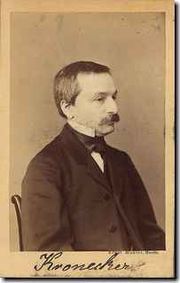Leopold Kronecker
Leopold Kronecker (7 December 1823, Liegnitz,[1] Germany – 23 December 1891, Berlin, Germany) was a German mathematician.
Kronecker received his PhD thesis, entitled De Unitatibus Complexis [On complex units] from the University of Berlin in August 1845. This work was in the branch of mathematics known as number theory.
After his doctorate, he left Academia and went into business in which he was quite successful. In 1848 he married his cousin Fanny Prausnitzer with whom he had six children. Financially independent, Kronecker returned to the University of Berlin in 1855 as Privatgelehrter (unpaid researcher), where he, among others, tutored Georg Cantor. His research was on number theory, elliptic functions, and algebra, but most valuable was his work on the relation between these subjects. Because of his achievements Kronecker became full member of the Berlin Academy of Sciences in 1861. His work was so highly regarded that in 1868 he was invited to a professorship at the (then very prestigious) University of Göttingen; he declined because he did not want to leave Berlin. Finally, in 1883 he accepted a chair in Berlin as successor to Ernst Eduard Kummer (1810 - 1893).
Kronecker plays a noteworthy role in the history of mathematics by his belief that all of mathematics can be reduced to arguments that only involve integers and a finite number of steps. He is well known for the remark made during a lecture (Berliner Naturforscher-Versammlung 1886[2]):
Die ganzen Zahlen hat der Liebe Gott gemacht, alles andere ist Menschenwerk [The whole numbers are created by God, all else is the work of man].
It appears that, from the early 1870s on, Kronecker was opposed to the use of irrational numbers, upper and lower limits, and the Bolzano-Weierstrass theorem, because of their non-constructive nature. In addition Kronecker was of the opinion that transcendental numbers cannot exist.
Leopold Kronecker died on 23 December 1891[3] from the effects of bronchitis. His name lives on in the Kronecker delta and Kronecker product.
Reference
- ↑ Kronecker's birth place is now in Poland and called Legnica
- ↑ H. Weber: Obituary of Kronecker Jahresbericht der Deutschen Mathematiker-Vereinigung 1892 (in German).
- ↑ As mentioned on Kronecker's tombstone, but in contradiction to Weber's obituary who gives the date 29 December 1891.

